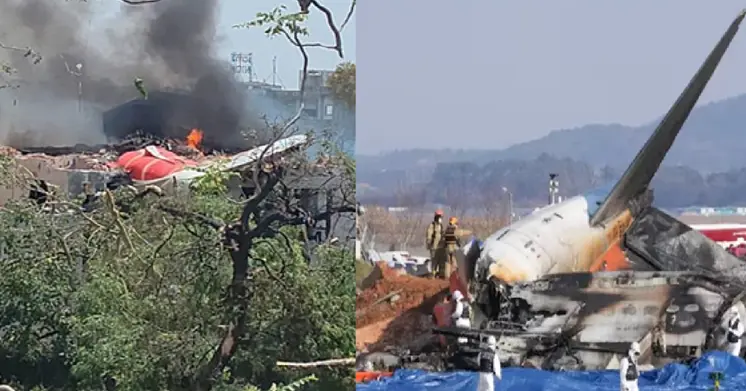
Pilots’ associations fiercely criticize the Air India crash investigation report, alleging bias, procedural flaws, and unfair blame on the crew
The Tragedy and the Technical Trigger
Air India Crash Report – On June 12, 2025, Air India Flight AI171 a Boeing 787 Dreamliner en route from Ahmedabad to London Gatwick crashed seconds after takeoff, killing 260 people, including 241 onboard and 19 on the ground. The aircraft collided with the BJ Medical College hostel building, leaving a trail of devastation and unanswered questions.
The Aircraft Accident Investigation Bureau (AAIB) released its preliminary report on July 13, revealing that both engine fuel cutoff switches transitioned from “RUN” to “CUTOFF” within seconds of liftoff. This led to a complete loss of thrust and the aircraft’s rapid descent. The cockpit voice recorder captured a chilling exchange:
“Why did you cut off?”
“I did not.”
This brief dialogue has become the centerpiece of a growing controversy. The report did not assign blame but hinted at a possible inadvertent or unexplained manual action. However, it failed to clarify whether the switch movement was mechanical, accidental, or deliberate — leaving room for speculation and outrage.
The pilots commanding the flight were Captain Sumeet Sabharwal, 56, with over 15,000 hours of flying experience, and First Officer Clive Kunder, 32, with over 3,400 hours. Both were considered highly competent and well-trained.
Pilots’ Associations Push Back: “You Don’t Even Know the Basics”
The Airline Pilots’ Association of India (ALPA) and the Indian Commercial Pilots’ Association (ICPA) have strongly objected to the AAIB’s preliminary findings, accusing the bureau of procedural flaws, technical inaccuracies, and a bias toward pilot error.
ALPA President Captain Sam Thomas criticized the report’s release timing late at night and its lack of official signatures. He pointed out basic errors, such as mislabelling the Full Authority Digital Engine Control (FADEC) system as “dual engine control,” and the omission of critical flight data like altitude.
“You don’t even know the basics,” Thomas said, referring to the report’s terminology errors and lack of clarity.
The associations argue that the investigation is being steered toward presuming pilot fault, without conclusive evidence. They’ve demanded observer status in the probe to ensure transparency and accountability, citing their domain expertise and global affiliations with IFALPA the International Federation of Airline Pilots’ Associations.
ALPA also questioned why the 2018 FAA advisory on fuel switch locking mechanisms was ignored. The advisory recommended inspections of the locking feature to prevent accidental switch movement a potential factor in this crash. Air India reportedly did not act on the advisory, citing its non-mandatory status.
Media Speculation and the Suicide Allegation Storm
In the aftermath of the crash, some media outlets and commentators speculated about pilot suicide a claim that has drawn fierce condemnation from pilot unions and aviation experts.
The ICPA called such narratives “reckless and unfounded,” warning that they undermine ethical journalism and disrespect the victims’ families. They emphasized that pilots undergo rigorous psychological screening, continuous training, and regular fitness evaluations.
“There is absolutely no basis for such a claim at this stage,” the ICPA stated.
“Invoking such a serious allegation based on incomplete or preliminary information is not only irresponsible it is deeply insensitive.”
The associations urged media outlets to exercise restraint and avoid sensationalism, especially when dealing with tragedies involving human lives and professional reputations. They stressed that the cockpit exchange though brief and dramatic should not be used to draw conclusions without full context.
Aviation experts echoed this sentiment. John Cox, a former U.S. ALPA representative, noted that the AAIB’s report did not appear overtly biased and that speculation should be avoided until the final findings are released.
The Call for Reform: Transparency, Inclusion, and Systemic Accountability
The controversy surrounding the Air India crash probe has sparked broader questions about investigative integrity, regulatory oversight, and systemic accountability in Indian aviation.
Key concerns raised by pilot associations and experts include:
- Lack of qualified aviation experts in the investigation team
- Secrecy and selective leaks of preliminary findings
- Failure to act on FAA advisories regarding fuel switch locks
- Absence of procedural transparency, including unsigned reports and missing data
ALPA and ICPA are now considering legal action to be included in the investigation panel. They argue that their technical expertise and global affiliations make them valuable contributors to a fair and fact-based inquiry.
Meanwhile, Civil Aviation Minister Ram Mohan Naidu urged restraint, emphasizing that the report is preliminary and that conclusions should wait for the final findings. He acknowledged the complexity of the investigation and assured that the ministry is analyzing the report meticulously.
“Let’s avoid jumping to conclusions,” Naidu said.
“Only when the final report is available can we reach a definitive conclusion.”
The AAIB has stated that a five-member team including pilots, engineers, psychologists, and flight recorder specialists is conducting the probe. However, pilot unions remain skeptical, citing the lack of transparency and exclusion of key stakeholders.
The crash also raises questions about Air India’s internal safety protocols, especially regarding compliance with international advisories and maintenance records. The aircraft’s throttle control module, which houses the fuel switches, had been replaced twice in 2019 and 2023 but no action was taken on the FAA’s 2018 bulletin.
Final Thoughts
The Air India Flight AI171 tragedy is not just a story of technical failure it’s a test of how aviation authorities, media, and stakeholders respond to crisis, accountability, and truth. As the investigation unfolds, the demand for transparency, inclusion, and respect for professional integrity grows louder.
For now, the pilot community stands united in its call for fairness. And the public watches closely, hoping that the final report will bring clarity not conjecture.
Stay updated with the latest news on Rapido Updates. Keep yourself updated with The World, India News, Entertainment, Market, Automobile, Gadgets, Sports, and many more